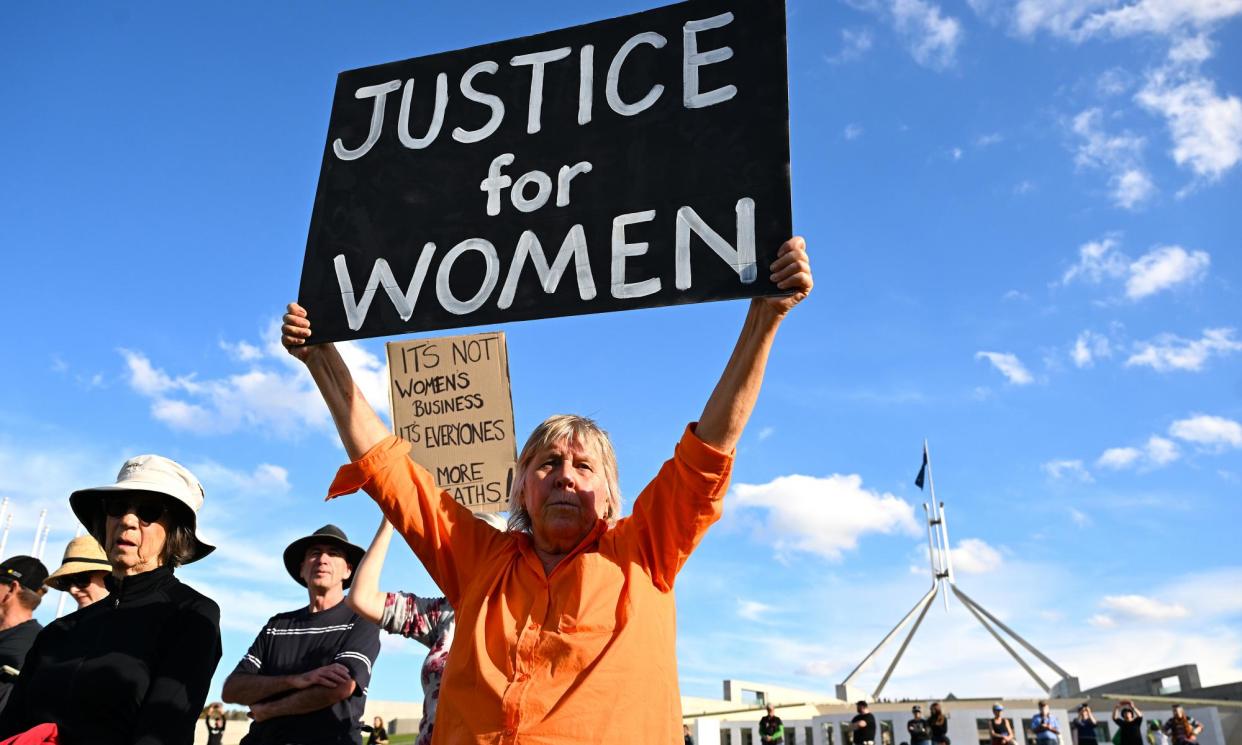National cabinet eyes improved information sharing on gender violence offenders

The upcoming national cabinet will aim to prevent gendered violence incited online and improve information sharing about high-risk perpetrators and serial offenders.
The South Australian premier, Peter Malinauskas, revealed on Monday that he had discussed “sharing of intelligence about perpetrators across jurisdiction” with the prime minister as a potential outcome of Wednesday’s meeting.
In the wake of No More rallies around Australia over the weekend, Anthony Albanese has described violence against women as a “national crisis”, saying “a woman dies every four days, on average, at the hand of a partner”.
Related: PM brushes off accusation he lied about speaking arrangements at violence against women rally
Organisers of the rallies have made demands including justice system reform at the state level such as alternative reporting options for violence victims and specialist courts, a declaration of a national emergency, and requests of all levels of government to give better, more sustainable funding for organisations that combat gendered violence.
The family and sexual violence commissioner will present at Wednesday’s national cabinet. One of the priority areas for the agenda will be strengthening prevention efforts including through a focus on online harms, such as countering violent and misogynistic content, and access to age-inappropriate material on social media.
Albanese said he was keen to “work with all the premiers and chief ministers on how we eradicate this scourge of violence against women”.
“It is not enough to support victims, or mourn them – we need to focus on the perpetrators and on prevention.
“The heartbreaking reality is that there are no overnight solutions to violence against women. This is hard work and demands a real cultural change. We are committed to making progress.”
Earlier, Malinauskas told reporters he had spoken to Albanese on Sunday about “potential initiatives” that could benefit from “national coordination”.
“Particularly, we were talking about sharing of intelligence about perpetrators across jurisdiction, sharing intelligence about different initiatives of states or non government organisations … that are having an effect.”
Malinauskas said that data-sharing between police largely occurs already, but argued that the national firearms registry was a “significant step forward” and could act as a precedent to be adopted for “domestic violence perpetrators moving from one state to the other”.
The comments echo a proposal from the former Queensland attorney general Shannon Fentiman to create a national domestic violence register to track violent partners in the same way as child-sex offenders. The proposal was for a law enforcement tool, not a public register.
But on Monday the Queensland attorney general, Yvette D’Ath, said there are “pros and cons” to a register.
“We haven’t got one here in Queensland, because the evidence and all the reports that have been done, show that it actually can be detrimental, and drive people underground,” she said.
“And I will say this about a domestic and family violence public register, that alone would have grave concerns that people think that that gives them confidence to safely stay with a partner, because they’re not on that list.
“Just the reality is that if you’ve already got red flags going off, that you think you should check a register to see if they’re on there, you already know that you’re probably in an unhealthy relationship.”
D’Ath said Queensland had heard from stakeholders that there “are other priorities to be delivered first” including coercive control legislation, which some states are pushing for a nationally coordinated approach on.
Malinauskas said South Australia has committed to legislate a coercive control offence. Other justice system responses, such as bail law reform, would be informed by that state’s royal commission into domestic violence, which he said would operate alongside the national cabinet response.
The federal government will also be pressed for more funding. Earlier on Monday the Queensland premier, Steven Miles, announced a $36m funding boost to respond to domestic, family and sexual violence in 2024-25.
“We’re looking forward to discussing this issue with national cabinet on Wednesday,” he said.
“And clearly, one of the things the Australian government could do is match these kinds of commitments.”
Guardian Australia understands the Northern Territory will also push for needs-based funding to combat domestic and family violence at the meeting.
The New South Wales minister for the prevention of domestic violence and sexual assault, Jodie Harrison, said: “We all need to do more. And we’ve made clear nothing is off the table.
“The NSW Labor Government is committed to working with experts, victim survivors, all sides of politics and all levels of government.
“There is no one single solution but what is clear is the status quo isn’t working.”
The NSW government is conducting a review of the Bail Act, to include the NSW women’s safety commissioner. “If we need to make changes to our laws and policies, we will do so,” Harrison said.
Ahead of the meeting, the deputy Liberal leader, Sussan Ley, took aim at the Albanese government for failing to deliver its promise of 500 new domestic violence support workers.
“We want the government to succeed in dealing with this crisis, but Albanese’s failure to come anywhere near delivering these promised supports requires scrutiny.”
The Tasmanian premier, Jeremy Rockliff, said “women must have the right to not only feel safe but to be safe at all times”.
“The Tasmanian government looks forward to working with the federal government on the immediate actions that can be delivered,” he said in a statement.
The premier of Victoria, Jacinta Allan, said the state “leads the nation when it comes to addressing family violence – with Australia’s first royal commission and investing more than any other state, ever”.
“But we need to do more … This is a national crisis, and needs a national response.”


